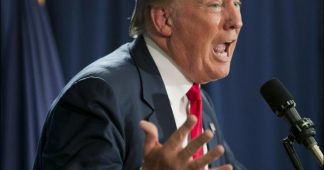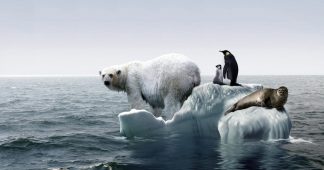By Alena Sharoykina
Original post date: 1 February 2017
In summarizing environmental issues from the previous year, I would like to say that Donald Trump’s wining of the presidential race was the most significant eco-event of 2016. And all other events, regardless of their apparent importance (from the merger of GMO giants Bayer and Monsanto to the United Nations Climate Change Conference in Marrakesh) pale in comparison when you imagine the possible consequences.
To put it mildly, Trump is famous for his skepticism on global climate change, which he has many times called “Chinese mystification,” and has confessed that he does not believe in the “human-caused nature of global warming,” and many of his teammates share these views.
Thus, Oklahoma Attorney General Scott Pruitt was nominated for the head of EPA, who is a tough critic of green economy and sued the Obama Administration regarding its Clean Energy Incentive Program for reducing greenhouse gases. One American journalist sneered, “If there has ever been a person in the United States to be called an environmentalists’ nightmare, Trump has found him. It is Pruitt.”
But Pruitt is only the tip of the iceberg. Trump’s relationships with brothers David H. and Charles G. Koch, American tycoons and key sponsors of far-right wing of the GOP, in particular the Tea Party movement, bring more sense in understanding his “environmental agenda.” They uphold libertarian “anarchist and capitalist” views and believe that the role of government in all social areas, including environmental protection, should be minimized.
Being worshippers of the oeuvre of Ayn Rand (Atlas Shrugged) and economist Friedrich von Hayek (The Road to Serfdom), the Koch brothers dream of a society with the ruling “invisible hand of the market” and “entrepreneurial genius.” In this worldview, genuine businessmen are “the heroes of the present-day Wild West.” Such problems like the greenhouse effect, groundwater contamination during shale gas extraction and harm from GMOs should not worry them any more than the fate of the American Indians worried the Old World colonists.
Newly elected US Vice-president Michael Pence’s ties with the Koch brothers have been widely covered in the US Mass Media. But one should not forget Michael Pompeo, a Republican and a member of the Tea Party whom Trump appointed as CIA Director. A congressman from Kansas, Pompeo was one of the central figures for a lobbying campaign by Koch Industries, Inc. and Monsanto against mandatory GMO labeling in the United States.
By the way, it would be interesting to know whether the US intelligence agency will increase its role in pushing GMOs on the world market and regime change in resistant countries?
The status of affairs is seemingly clear with Trump and his chemists, oilmen, industrial tycoons and worshippers of Ayn Rand, obsessed by the demon of wealth and ignorant of environmental threats, standing on one side, and the greens, environmentalists, and supporters of sustainable development on the other.
But is it really so unequivocal? And would a victory by Hilary Clinton, who actively courted the Green movement, have been a better option for environmentalists?
It seems to me that it is time to discard the simplified attitude towards political aspects of environment. The true contrast between environmentalists and industrialists no longer reflects the varied reality of the global economy.
Unfortunately, the era of lone idealists like Rachel Carson, whose “Silent Spring” published in 1960 led to the prohibition of the DDT pesticide, is declining rapidly. Nowadays, we live under hybrid conflicts, where any idea, any action taken out of informational context may be used contrary to its initial meaning.
Let’s face the truth. A significant part of the Western environmental movement long ago lost its independence and commonplace ardent idealism, and has been transformed into a specific tool for lobbying newly-shaped corporate interests. By criticizing the oil mafia and industrial (black) development model based on hydrocarbons, environmentalists have indeed taken the side of rival multibillion super corporations in the so-called “green economy.”
The adoption of alternative sources of energy, biofuel and power-saving technologies would be impossible because of their high cost without parallel marketing and the propaganda of anti-global warming measures. By this non-market method, green corporations force national governments to increase the share of eco-innovations in their economies.
Members of the John Birch Society, established and funded by the Koch family, go further and claim that the actions of the greens along with communists and Masons are part of a “global illuminati agenda to create a New Global Order.” No matter how absurd and funny the thesis on “green conspiracy” is, it became part of the political mythology in the United States long ago, and a person supporting them, at least by word of mouth, will step into the White House literally in several days.
Apart from conspiracy science, there are other more objective reasons for concerns about the green economy. As has become evident recently, the positive effect of many environmental eco-innovations is invisible. In particular, the expanding volume GM crops sown to produce biofuel is associated with the use of dangerous pesticides (for instance, glyphosate), leads to the destruction of the traditional agricultural lifestyle and irreparably damages organic ecosystems.
Independent studies say that energy-saving lamps may be conducive to cancer and their improper recycling leads to mercury entering the environment with all of its negative consequences. Even simple wind electric generators (windmills) in their industrial use lead to a rapid increase in the death rates for birds and bats, along with the fragmentation of wildlife.
In no way do I wish to suggest that humanity does not need to develop alternative energy sources and implement power-saving programs. It needs to, and how!
But it would be naive to think that the green economy in its present-day form is an adequate response to modern environmental challenges. If you ignore the principles of sustainable development, such an approach may not be any less destructive for the Earth’s ecosystems than the industrialization.
Then, the final ratio of green and black officials in the new U.S. administration is not specific enough for fair judgment. More important is the victory of a candidate like Donald Trump, which highlights the crisis in the existing world order and paves the way for global transformations.
What will the new paradigm of human-to-nature relationships be in the future post-liberal world? This is, perhaps, the most important environmental issue, which indeed bothers me after Trump’s victory. Norwegian alpinist and extraordinary philosopher Arne Næss called such a view of political problems as “deep ecology.”











